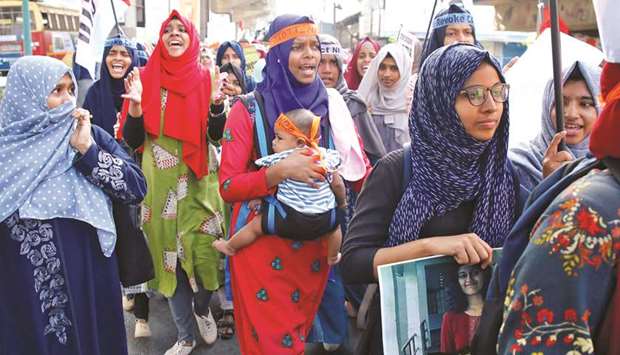Kerala yesterday became the first state in the country to legally challenge a new citizenship law that has sparked nationwide protests.
The Citizenship Amendment Act (CAA) 2019 is a violation of several articles of the constitution, including the right to equality, Kerala’s Communist Party of India (Marxist) government said in its petition before the Supreme Court.
The law also goes against the secular nature of the constitution, according to the petition available on legal website LiveLaw.
Kerala’s assembly was also the first state assembly in India to pass a resolution against the law, which is strongly backed by the federal government and the ruling Bharatiya Janata Party (BJP).
There have been demonstrations for weeks against the CAA, which omits Muslims from a list of religious groups from three neighbouring countries who are entitled to fast-track citizenship.
Critics have said the law defies India’s secular constitution and constitutes an attempt at marginalising the minority Muslim population.
The BJP government says the law would not affect the rights of any citizen of India - Hindu or Muslim, and has accused opponents of spreading misinformation.
At least 60 petitions filed by political parties and civil society groups challenging the validity of the new law are pending before the top court and are due to be heard on January 22.
In India’s most populous state of Uttar Pradesh, which is ruled by the BJP, authorities have already started enacting the law as of January 10.
State minister and spokesman Shrikant Sharma told reporters on Monday that the government had begun identifying illegal migrants who might be eligible for citizenship under the law.
Around 32,000 people had been identified in 21 of the state’s 80 districts and more would be added as the process was ongoing, he added.
Several non-BJP state governments said they will block efforts to enforce the citizenship law.
Microsoft CEO India-born Satya Nadella also joined the chorus against the law, following criticism by a number of Indian writers and civil society groups.
“My hope is for an India where an immigrant can aspire to found a prosperous start-up or lead a multinational corporation benefiting Indian society and economy at large,” he said, according to a statement released by Microsoft India.
Nobel laureate Amartya Sen too has criticised the decision.
On Monday he stressed the need for opposition unity for carrying forward the protests, but said even if there was no unity, the protesters still have to move on and do whatever is necessary.
“Opposition unity is important for any kind of protest. Protest becomes easier then,” Sen said on the sidelines of an event in Kolkata yesterday.
“Unity is important if the the protest is for a proper cause. But if unity is not there, it doesn’t mean that we should stop protesting.
“As I said, unity makes protests easier, but if unity is not there, we still have to move on and do whatever is necessary,” he added.
Sen, who won the Nobel prize in Economics in 1998, has emerged as one of the strongest civil society voices against the law.
Last week, he called for scrapping the CAA, saying it was not in tune with the Indian constitution.
“Under this Act, whether citizenship will be given or not will be decided after ascertaining the religion of a person. This definitely is not in tune with the constitution. Such an Act should not have been passed in the first place,” Sen said.
Meanwhile, a police complaint was lodged against BJP West Bengal unit president Dilip Ghosh for his threat to “beat up” and “shoot’ “ anti-CAA protesters, whom he called “infiltrators”.
The complaint was filed by Trinamool Congress worker Krishnendu Banerjee, who alleged that Ghosh was inciting communal passion.

Demonstrators attend a protest rally against a new citizenship law in Kochi yesterday.


